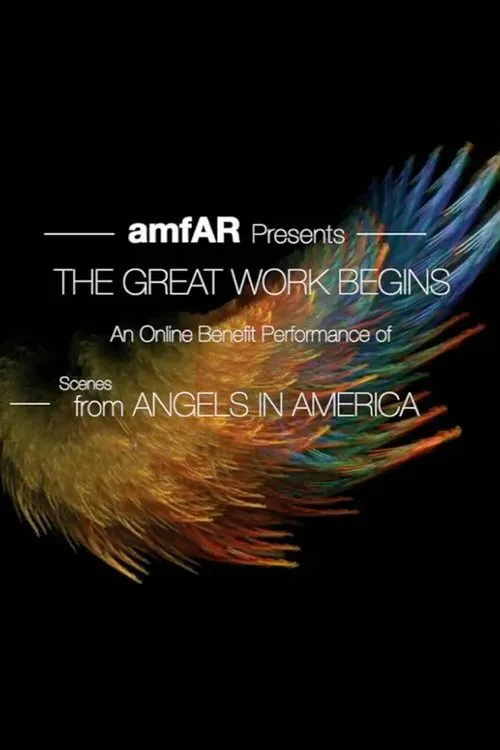The Great Work Begins: Scenes from Angels in America

Plot
In a unique adaptation, "The Great Work Begins: Scenes from Angels in America" weaves together pivotal moments from Tony Kushner's monumental two-part play, "Angels in America." This all-star livestream performance serves as a tribute to the playwright's legacy while raising crucial funds for the amfAR Fund to Fight COVID-19. The scenes blend elements from both "Millennium Approaches" and "Perestroika," expertly showcasing the play's intricate narrative and profound characterizations. The adaptation begins in the midst of the HIV/AIDS crisis, where Prior Walter, an openly gay man battling the disease, forms a bond with Joe Pitt, a conservative Mormon lawyer. As they navigate the complexities of a deteriorating social and personal context, Prior seeks solace in a mysterious force that promises to guide him through the tumultuous period. Meanwhile, Harper Pitt struggles to reconcile her own desires and the societal expectations thrust upon her as a wife and an individual. Her relationship with her husband, Joe, is put to the test as she grapples with the strain of his moral ambiguity and her own disconnection from her husband's increasingly rigid values. As the scenes unfold, we encounter the complex figure of Louis Ironson, Prior's partner, who grapples with the devastating news of his own HIV diagnosis and the subsequent emotional trauma. Louis's introspection highlights the devastating loss of connection between gay men during the height of the AIDS epidemic, where societal ostracization, guilt, and fear contributed to the erosion of their personal relationships. Milton, a charismatic but troubled gay man, and Belize, a witty and compassionate nurse, add depth to the narrative as they delve into the lives of those suffering through the crisis. Through their interactions with various characters, they shed light on the profound emotional and psychological strain of living through the AIDS epidemic. Roy Cohn, a ruthless and cunning lawyer, serves as a central force in the play's narrative, embodying the dark underbelly of 1980s American politics. As his true nature is slowly revealed, Cohn exemplifies the destructive powers of homophobia and anti-Semitism, casting a long shadow over those around him. Through Kushner's poignant and evocative writing, "The Great Work Begins" masterfully captures the atmosphere of fear, disillusionment, and resilience that defined the late 1980s. By highlighting the intersection of individual relationships and larger societal forces, the adaptation skillfully portrays the profound impact that the AIDS crisis had on lives and communities. The scenes presented in this benefit performance distill the essence of Kushner's vision, emphasizing the transformative potential of the individual and the importance of confronting the darkness that has plagued and continues to plague society. This unique adaptation serves as a powerful testament to the enduring legacy of "Angels in America," cementing its place as a landmark in American dramatic literature. Throughout the performance, Kushner's work is augmented by the talents of a diverse ensemble cast, each bringing their own unique interpretation to their respective roles. Their collective talents imbue the narrative with a sense of urgency, emphasizing the importance of solidarity and compassion in the face of adversity. Ultimately, "The Great Work Begins: Scenes from Angels in America" stands as a poignant tribute to the indomitable human spirit, underscoring the enduring relevance of Kushner's work in the face of ongoing struggles and crises. By donating to the amfAR Fund to Fight COVID-19, the actors and filmmakers involved in this production underscore their commitment to supporting the world's most vulnerable populations during a time when their health, safety, and well-being hang in the balance.
Reviews
Recommendations


